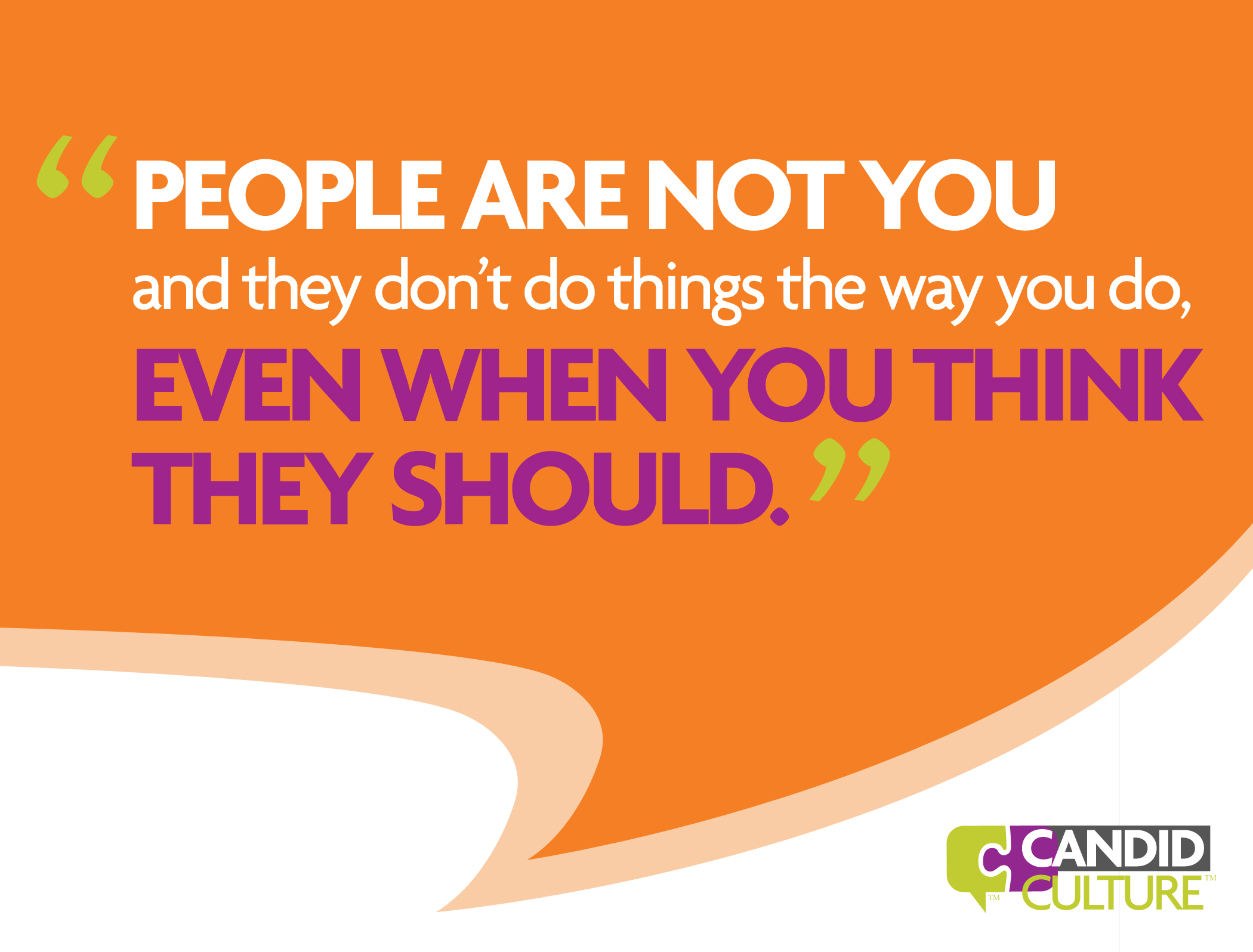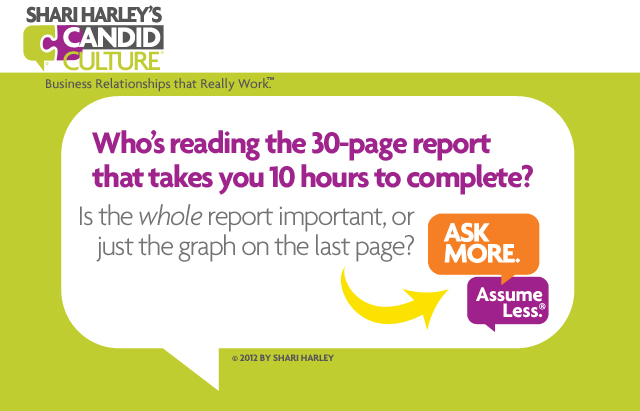No matter how much you like and get along with your boss, your boss is not your friend. Nor is your boss your confidant or venting buddy.
Unless your boss follows you around all day, every day, she is not aware of all the things you do at work. And if she does follow you around, she probably needs more to do, which I doubt.
Given that your boss often doesn’t see you work, the only exposure you may have to each other is during one-on-one and group meetings. So be careful how you behave during these meetings.
I’ve made lots of career mistakes . . . once. Here’s a mistake I made before launching Candid Culture. I’m hoping you won’t replicate it.
In my last job, I was lucky enough to have a great boss. He was a good coach and mentor. He supported me, gave me exposure throughout the company, and always had my back. We didn’t cross paths much at work, except during our regularly scheduled one-on-one meetings.
I’m what some might call passionate. I have a strong sense of what is right and what is wrong. And I can be critical of those who I think don’t do the right things.
I would often share my frustrations with my boss. The head of that department didn’t do this. This person made a bad call. So and so was making my employees’ lives hard. I wasn’t complaining, well I kind of was, but not without a purpose.
One day my boss called me out on my passionate (and at times critical) style. He said that if I was so impassioned during meetings with him, he assumed I was equally vocal in meetings with other people and departments.
This wasn’t the case. I was very careful in how I managed myself with other people in our company. I understood the importance of good business relationships and knew that people work with the people they want to work with and around the people they don’t.
But my boss didn’t get to see any of those interactions. For the most part all he saw was how I interacted with him during our meetings. With no other point of reference he was left to assume that if I vented with him, I did this with other people. If I got a little too soapboxish about an issue with him, I must do the same in other meetings. I didn’t do those things with other people, but he had no way to know that.
My boss and I had a good relationship and I felt comfortable with him, probably too comfortable. I was politically savvy with everyone but him.
Your boss is an appropriate person with whom to express frustration, but manage how you do it. Don’t vent to vent. Every topic you raise should be with the aim of problem solving. Keep things honest but positive. Vent and complain at home, or with someone who doesn’t know the people you work with. Or better yet, spare your friends and family, and take your frustration to the gym, or the shoe department, whatever your preferred form of therapy.
Assuming you have limited exposure to your boss, make the time you have with her count. Put in front of your boss only what you want her to see. I’m not saying to be disingenuous or brush problems under the rug. Speak candidly, but manage yourself with your boss as you would with any internal or external customer.
If you stayed out until two in the morning and you’re dragging the next day, your boss doesn’t need to know that. She will assume you’re not on your game that day and that will be a check mark in the negative category for lacking good judgment and commitment to your job and the company. If you had a bad date, your boss doesn’t need or even want to know. If you think someone you work with is a dolt, ask for help in how to work well with him, and keep your opinion of his acumen to yourself.
Your boss has limited time and exposure to you. Manage yourself by showing him your polished and professional self.
Unfortunately people taking phone calls via speaker phone, listening to music without headphones, and entertaining a posse’ of visitors in his/her cube is not limited to the movie Office Space, which should be required viewing for anyone who works with other people.
Cubeland can be loud. And most people are hesitant to ask our coworkers to quiet down. We’re afraid of the conflict. We don’t want our coworkers to dislike us, talk poorly about us when we’re not there, or kill us off. So we suffer in silence, hoping the person will get a clue that he’s making us crazy. He won’t. If he knew the phone calls bugged you, he would have already stopped making them.
You may find it incredulous that your coworkers don’t know how annoying noise in cubeland is. It’s an obvious, no brainer. How could they not know?

Much of Candid Culture’s work is dedicated to people feeling more comfortable telling the truth at work. But even with books, and training on how to establish candid relationships and tell the truth, speaking up is often challenging. So know that if you are doing annoying people at work, they are not likely to tell you.
Here’s what you can do: Avoid annoying people at work. For your convenience, I’ve made a short list.
- Conversations, music, and phone calls taken on speaker phone in cubicles. Take the meeting or conversation to an empty office or conference room.
- People who are late for meetings and text or email throughout meetings.
- People who start most sentences with, “No we can’t do that, and here’s why.”
- People who say they’ll do something and miss the deadline every time.
- People who borrow your stuff and don’t return it.
Look at how much stress I’ve saved you. Now you don’t need to give the people you work with feedback, you can just forward them this blog, which is a passive aggressive form of feedback. But it beats throwing their phone out the window or hiding out in an empty office so you can actually get some work done.
If you choose candor instead (which I, of course, prefer) simply say, “It’s hard to work when music is playing, or when you’re on your speaker phone, or you’ve got visitors in your cube. I know space is at a premium. But if you’d be willing to take the conversations elsewhere, I’d really appreciate it.” Done in twenty seconds or fewer. And no one died. You can do it. And if you can’t, call me, and I’ll do it. It’s always easier to have these conversations when they’re not your own. But it will cost you a bag of chocolate chip cookies or perhaps a Candor Bar.
The sprinkler guy just left my house, after teaching me the nuances of how sprinklers work for TWO hours. I don’t want the details about how the sprinklers function. I don’t care. I just want them to work. And I told the sprinkler guy this. But he insisted on teaching me –a.k.a. dragging me to each broken sprinkler head and having me observe as he repaired it. Exasperating! Then he billed me for his time. Without the lesson the visit would have been 30 minutes and $45. With the lesson, it was two hours and $130.
Read your audience. Are you putting in too much work?
Where are you over communicating? Who’s reading all of those PowerPoint presentations and reports? Just because you’ve created that report for the past five years doesn’t mean it’s still necessary or desired.
Ask your internal and external customers (everyone you work closely with) how they want to receive information, in what format, and how frequently.

Ask internal and external customers:
- Do they prefer to receive information in bullets or narrative form? Detailed or big picture? Graphs and/or charts?
- What information is important and what is unnecessary?
- Who needs to receive the information? People have enough to read. Most people won’t be insulted to receive one fewer email.
- How often do they want to receive the information?
I am hesitant to change processes when I begin working with an organization, assuming there is a good reason they exist. But when I ask why we do certain things as we do, invariably no one can tell me. I am often told, “We’ve just always done it that way.”
Don’t change things just to change them. And before you make a change, consult those who are impacted. Ask what people want and what they don’t. Then make changes. You may just pick up 10 extra hours each week and reduce your and others’ frustration 20 fold.




